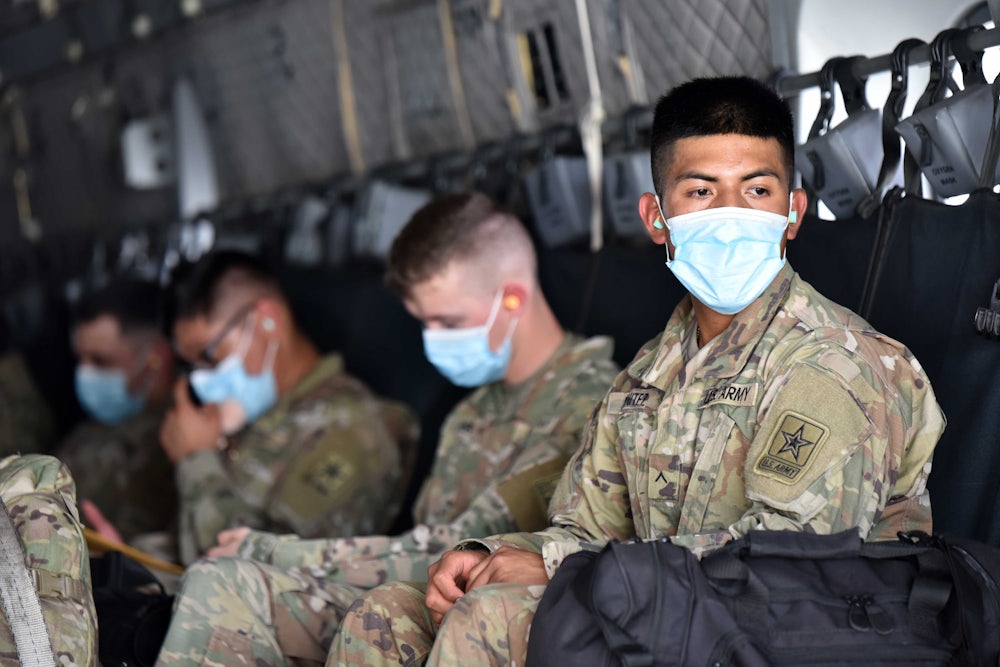Last month, the military turned itself inside out over an aircraft carrier captain who pleaded for better care for his coronavirus-stricken crew. This month, the military has made coronavirus a disqualifying condition for military service.
A Defense Department memo distributed last week to military entrance processing stations, or MEPS, first uncovered by Military Times, instructs medical personnel who are screening military enlistees that, “During the medical history interview or examination, a history of COVID-19, confirmed by either a laboratory test or a clinician diagnosis, is permanently disqualifying” from service.
That’s a drastic measure on its own, notwithstanding that the defense establishment has fallen far short of its recruiting numbers, been racked by more than 7,000 confirmed cases of coronavirus infection, struggled to give its worldwide commanders Covid-19 guidance, lost quarantined cadets to suicide, and left many military families in financial and deployment limbo during the pandemic. But the rule is nothing if not consistent with these problems, as it’s sowing widespread confusion and could even put more service members at risk of infection.
A military official who spoke with McClatchy’s Tara Copp on Thursday stressed that the decision to make Covid-19 a “permanently disqualifying” condition for new enlistees was only “interim guidance,” and any coronavirus disqualifications would be subject to further review:
The official said the new policy would not necessarily disqualify a potential recruit, but would force an additional review where the recruit would need to get a waiver to move forward with the enlistment.
The new policy would mean a past coronavirus exposure would be treated the same as other medical conditions, such as hearing loss, “that are considered ‘permanently disqualifying,’ subject to a medical waiver,” the official said.
Besides rendering terms like “permanently disqualifying” meaningless, there are two serious problems with that official’s reasoning. First, for other “disqualifying” but waiverable medical conditions, there are already robust, thought-out rules to guide review boards’ decisions. The Air Force’s guidance for waivers of Lasik eye surgeries runs 13 pages, for example. No such advice apparently yet exists for boards to consider grace for documented coronavirus sufferers: Will virus-genetics tests be given the same weight as antibody tests? Will privately administered tests factor the same as public-agency testing regimes? How much retesting can a recruit request? What even is the aim of the new rule in shaping the force? In the absence of black-letter answers to these questions, review boards presumably will have to defer to a MEPS doctor’s decision to bar the enlistees from joining up. Should answers materialize later, enlistees who were barred earlier will have legitimate questions about how fairly they were treated.
That leads to the second serious problem, one that the Government Accountability Office has been warning about for more than two decades. In the military’s long-standing system of screening out medically unqualified applicants, “reliance is placed heavily upon applicant self-disclosure of his/her medical history,” according to a recent GAO report: That “creates the possibility that an applicant could conceal a potentially disqualifying medical condition” when they’re joining up. In my brief naval service, I met plenty of shipmates who had successfully covered up broken bones, corrective surgeries, and chronic conditions to obtain their jobs.
In this case, the military is providing volunteers with a powerful incentive not to get tested for exposure to the coronavirus. According to the guidance, if an enlistee shows up at MEPS with Covid-19 symptoms, “but without confirmation by either a laboratory test or a clinician diagnosis,” they “will be allowed to return to the MEPS to continue processing” after a 14-day quarantine. It’s a perverse, twenty-first-century “don’t ask, don’t tell”: The underlying message seems to be that as long as you survive two weeks—and don’t risk taking a Covid-19 lab test that might pop positive—you’re good to go.
That’s heinous, troubling, and potentially dangerous to all recruits—par for the course for a military establishment that’s adrift after dealing with three years of caprices from Donald Trump and his administration on clemency for war criminals, anti-trans discrimination, anti-immigrant discrimination, relations with South Korea, relations with Iran, withdrawal from Syria, self-edifying military parades, and the creation of a Space Force, among others.
Just before its coronavirus-ban memo came to light, in fact, the military proudly unveiled its first Space Force recruiting commercial. “Some people look to the stars and ask: ‘What if?’” the ad’s narrator says. “Our job is to have an answer.” For now, if you’ve tested positive for the novel coronavirus, the answer is “No.”
